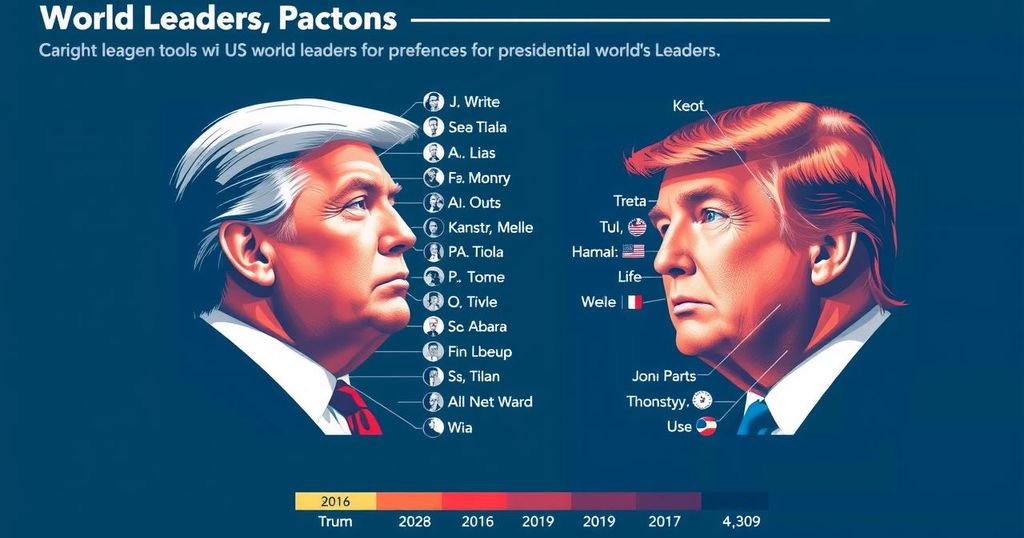Global Leaders’ Preferences: Harris vs. Trump in the U.S. Presidential Election

As the U.S. presidential election nears, world leaders express varying preferences for candidates Kamala Harris and Donald Trump. Putin appears to favor Trump, while Chinese officials might lean towards Harris. Netanyahu likely supports Trump due to their shared history, European leaders prefer Harris for stronger NATO ties, and Modi remains neutral. Concerns arise in Asia-Pacific regarding shifts in U.S. policy with either candidate.
As the U.S. presidential election approaches on November 5, polls indicate a fiercely competitive race between Democratic Vice President Kamala Harris and Republican former President Donald Trump. Given the significant influence of the United States on the global stage, leaders from various countries are keenly observing the electoral dynamics and contemplating their preferred candidate. Russian President Vladimir Putin has hinted, albeit in jest, that he might prefer Harris, but reports suggest a strategic leaning towards Trump, whom he views as potentially soft on Russia. Analysts assert that Trump embodies an authoritarian style that aligns with Putin’s worldview, and his presidency may lead to diminished U.S. support for Ukraine and reduced pressure on Russia through sanctions. Trump has previously expressed his intentions to end the conflict in Ukraine, which further endears him to the Kremlin. Regarding China, there is no clear public endorsement from President Xi Jinping for either candidate. During Trump’s administration, a trade war escalated, but he claimed to maintain a positive personal rapport with Xi. Scholar Jia Qingguo mentioned that, behind the scenes, there might be a preference for Harris among Chinese officials, primarily due to the stability she is perceived to offer following Biden’s administration. Israeli Prime Minister Benjamin Netanyahu remains silent on public endorsements but is believed to favor Trump based on their historically strong relationship. Trump is viewed by Netanyahu as a supportive ally, while ongoing military and diplomatic ties with the Biden administration are critical for Israel amid the ongoing conflict in Gaza. European leaders predominantly show preference for Harris, hopeful that her potential presidency would facilitate stronger NATO ties and a commitment to renewable energy initiatives. Notably, German Chancellor Olaf Scholz remarked on his familiarity with Harris, anticipating her competence as a president. Indian Prime Minister Narendra Modi appears neutral, valuing U.S. bipartisan support in fostering relations with India. The Modi administration perceives both candidates as capable of reinforcing India’s strategic partnership with the U.S. in countering China’s influence. In Asia-Pacific, South Korean President Yoon Suk Yeol has yet to endorse a candidate, but many analysts express concern over the unpredictability of Trump’s foreign policy compared to the current stability under Biden. Japan anticipates changes in U.S. focus and defense spending dynamics with either candidate, while Australian leaders voice apprehensiveness regarding Trump’s potential retraction from global environmental pacts. Overall, the complex interplay of global politics, national interests, and individual relationships among world leaders will significantly shape international expectations and reactions in response to the upcoming U.S. election.
The upcoming U.S. presidential election is drawing significant international attention due to the considerable impact that U.S. leadership has on global affairs. This interest is not only from direct allies but also from countries like Russia and China, whose leaders are analyzing which outcome aligns with their strategic interests. As the political landscape evolves, the preferences of these global leaders may influence diplomatic relations and international policy following the election.
In conclusion, the preferences of world leaders regarding the potential presidency of either Kamala Harris or Donald Trump reflect the intricate and often strategic dimensions of international relations. Putin seems to favor Trump for potential benefits to Russia, Xi Jinping’s officials may quietly lean towards Harris, and Netanyahu retains a longstanding friendship with Trump. European leaders generally prefer Harris, anticipating stronger NATO commitments, while India’s Modi adopts a neutral stance. South Korea and Japan express concerns over potential shifts in U.S. policy with either candidate, particularly regarding security and trade. As the election date nears, the implications of these preferences will undoubtedly be watched closely by global leadership.
Original Source: www.aljazeera.com






